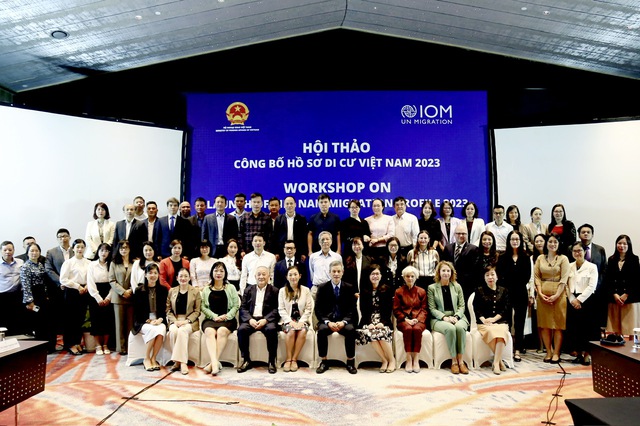Viet Nam issues work permits to over 475,000 foreign nationals in 2017-2022 period
VGP - Viet Nam issued work permits to as many as 475,198 foreign nationals between 2017 and 2022.

Delegates attending the workshop on launching the Viet Nam Migration Profile Report 2023, Ha Noi, October 29, 2024 - Photo: VGP
The above figure was released at a workshop held in Ha Noi on Tuesday to launch the Viet Nam Migration Profile Report 2023.
The findings of the report highlight the significance of migration data in policy-making and legislation related to migration, as well as Viet Nam's ongoing efforts in migration governance to ensure that migration benefits all.
During the period of 2017–2023, labor migration continued to be the predominant form of migration in Viet Nam, with nearly 860,000 workers going abroad for employment under contract, averaging more than 100,000 workers per year mainly in Japan, Taiwan and South Korea.
Migration for study also saw a similar increase. It is estimated that over 250,000 Vietnamese students are currently studying abroad, primarily in South Korea, Japan, Australia, the U.S., Taiwan, Canada, China, the United Kingdom, and Germany. The proportion of Vietnamese migrants who are female is on the rise.
The report was compiled under the leadership of the Consular Department of the Ministry of Foreign Affairs, with the participation of various agencies, as part of the project "Supporting Evidence-Based Policy and Programming on Cross-Border Migration in Viet Nam."
This project was jointly implemented by the Ministry of Foreign Affairs of Viet Nam and IOM, with funding from the IOM Development Fund (IDF).
The profile provides a comprehensive analysis of migration flows, including both Vietnamese citizens migrating abroad and foreign nationals migrating into Viet Nam, and the relevant policies and laws concerning migration during the period of 2017–2023.
It highlights the crucial role of migrants in promoting social development and economic growth, both in Viet Nam and in other related countries (countries of origin and destination). It concludes that if managed effectively, international migration can serve as a catalyst for sustainable development, contributing to the socio-economic development of each country, locality, community, and migrants themselves.
Through the report, as one of the leading countries in implementing the Global Compact for Safe, Orderly, and Regular Migration (GCM), Viet Nam has demonstrated a strong commitment to practical solutions that promote safe migration.
This highlights the necessity of developing evidence-based policies, in line with the Objective 1 of the GCM.
The report serves as an important policy tool, contributing to the improvement of Viet Nam's legal framework on international migration across various areas such as labor migration, educational migration, cross-border marriages, intercountry adoption, and the prevention and suppression of human trafficking, etc.
The profile aims to establish an international migration management mechanism based on effective coordination and information sharing between relevant ministries and agencies, while fostering close cooperation with countries and migration partners.
This approach seeks to protect the legitimate rights and interests of migrants and enhance the positive impact of migration on sustainable development./.
